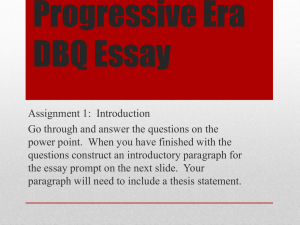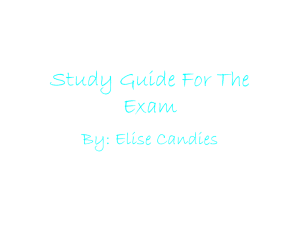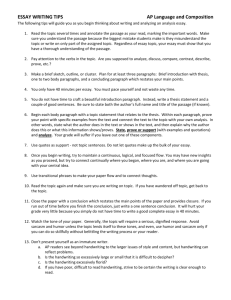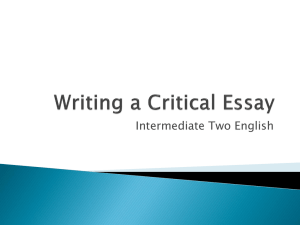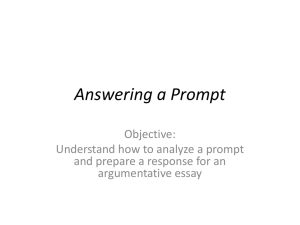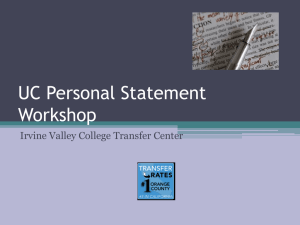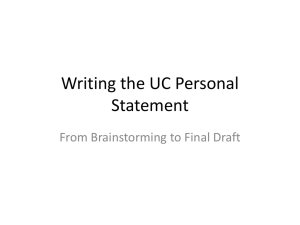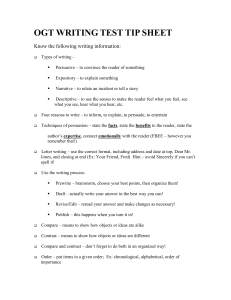Essay Strategies
advertisement
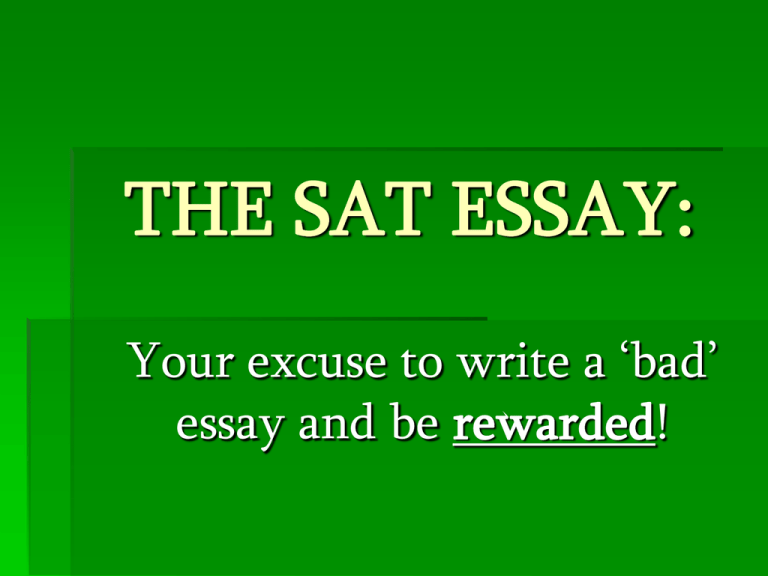
THE SAT ESSAY: Your excuse to write a ‘bad’ essay and be rewarded! How It’s Graded Two people score it, each out of 6, based on “overall impression.” Your scores are added together to give you a number out of 12. Grammar/Spelling, Organization/Structure, and Style count (so does handwriting…) Keep in mind: They’re reading THOUSANDS of essays… make it easy to give you a 12!. The 3 Things You Need 1. Length 2. Structure 3. Appropriate Examples Managing Your Time 3 Minutes: Brainstorm and plan. 20 Minutes: WRITE! 2 minutes: Write your conclusion. A Sample Prompt Directions: Consider carefully the following excerpt and the assignment below it. The plan and write an essay that explains your ideas as persuasively as possible. Keep in mind that the support you provide—both reasons and examples—will help make your view convincing to the reader. A popular song says, “You don’t know what you got ‘til it’s gone.” And Holocaust survivor Elie Wiesel, accepting the Nobel Prize, said “No one is as capable of gratitude as one who has emerged from the kingdom of night.” Assignment: What is your view of the claim that we often appreciate the things that we have no when we gain them but when we lose them? In an essay, support your position by discussing an example (or examples) from literature, the arts, science and technology, current events, or your own experience or observation. Writing the Way They Want Length is important. Use most of the booklet! Depth is better than breadth. Make sure to develop your ideas at length. Don’t just list a whole bunch without support. Consider your audience. Catch their attention right off the back. Don’t worry about accuracy; they don’t have time to fact-check! Use the Prompt Make sure you stay on topic (duh, right? Not so much…) You need to agree or disagree, and it’s okay to do either as long as you are EMPHATIC! Address the prompt directly so that the reader knows you’re answering it. Structure If you love the Five Paragraph Essay (vomit), you’re in luck… Intro Topic Sentence/Example 1 Topic Sentence/Example 2 Topic Sentence/Example 3 Conclusion Everything has to tie back to the intro. Your Intro Paragraph Short and sweet... No more than three or four sentences (one is a thesis). It won’t score you points; it can only cost you. You need to do three things: 1. State your position 2. Interpret the prompt 3. List the examples that you’re going to use ‘Good’ Intro I agree that sometimes we learn the most from failure. In fact, sometimes failure makes us realize things that enable us to act differently the next time. This important lesson can be seen in World War II, The Crucible, and the failure of the American peace mission in Somalia. Not As Good… It is totally true that sometimes failure teaches us. Life is full of situations where if we would just learn from our mistakes, we would do better. Body Paragraphs Begin each paragraph with a topic sentence that also works as a transition sentence. Make sure it connects back to your position (thesis) in your intro. Use only one example per paragraph Depth is the key! You must make sure that you develop your ideas if you want to score well. Spend two or three sentences explaining the example. Use three or four sentences to connect the example to your position. Then move on to the next paragraph! Transitions These tell your reader that you are moving from one idea or from one section of the text to another. It’s like holding their hand… “Another example of (blank) is…” “This effort was very successful. Not everyone, however, was so lucky.” “While beneficial to some, the new program will harm others.” Transition Words However While Although Furthermore Despite In addition Therefore Though Moreover Similarly Another (example, reason, point, etc.) Conclusion Make sure you have one! Again, you’re not going to gain too many points here, but you can lose them. It should be around three sentences. Wrap up your idea and leave the reader thinking about the brilliant lesson on life that you have just pointed out. Cheesy is okay! How ‘Cheesy’ Can I Be? “Perhaps we can all learn from the loss of others and start to truly appreciate the wondrous gifts that life has bestowed upon us now, before it is too late.” “Life is too short to live with the regret caused by the failure to do something that is within the grasp of each of us.” “Although it seems that appreciating what we have only once we’ve lost it is a prime example of ‘20/20 hindsight,’ perhaps the pain of our past losses can sharpen our focus so that we can truly cherish what we have today. Odds and Ends Don’t use big words just to sound ‘smart;’ you won’t help yourself. Just use the best word that you can think of. Make sure to vary your sentence structure, but don’t worry about making every sentence long and complicated… remember, they have to read THOUSANDS of essays! Make it look ‘pretty’… indented paragraphs, even margins, neat handwriting, etc. Examples: SOOO Crucial These are the bread and butter of your essay. You MUST have them! Make them accessible and understandable for the reader. Tie them to your position and the prompt. You can pick them out beforehand… Seriously. Try to use three examples from three different ‘categories.’ Examples: History They should be events that are taught in almost every high school in the US. Think of events with universal themes… things you can say a lot about. Examples: The Holocaust, The Civil Rights Movement, WWII, The Revolutionary War, The Civil War, etc. Examples: Current Events Anything that has been in the news lately will qualify here. You may want to avoid controversial topics or opinions so that you don’t offend the reader (Iraq, abortion, the death penalty). Examples: the US Election, the Summer Olympics in China Examples: Literature Stick to the ‘Classics.’ If you’ve read it in your high school English class, it’s fine. I know you may love Gossip Girl, but it probably won’t get you a good score. Don’t spend too much time explaining the plot; focus on the themes. Examples: To Kill A Mockingbird, Lord of the Flies, Things Fall Apart, Of Mice and Men Examples: Personal Experience You can make these up! How are they ever going to know if you’re telling a true story or not? Try not to go too far overboard though… Just make sure to relate your ‘experience’ to the prompt.

